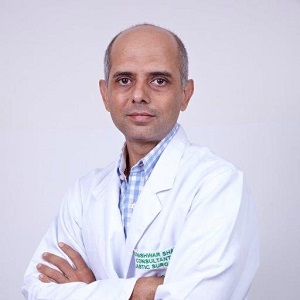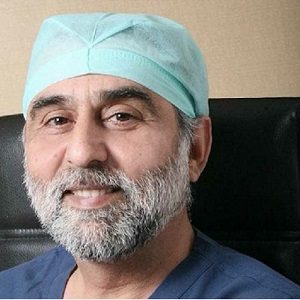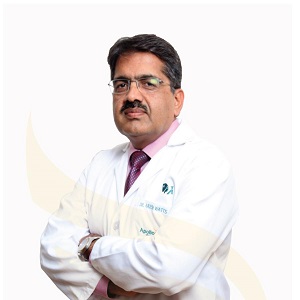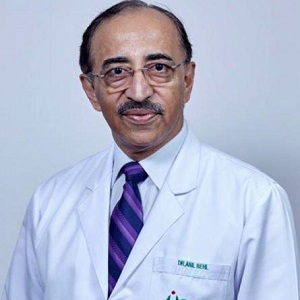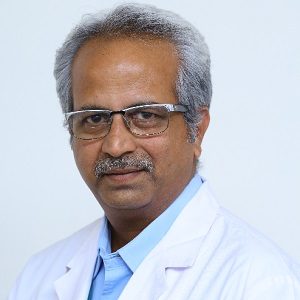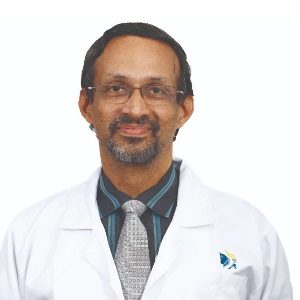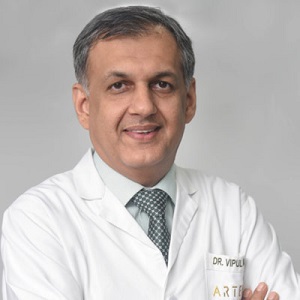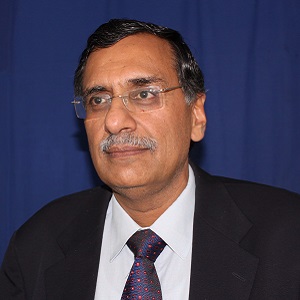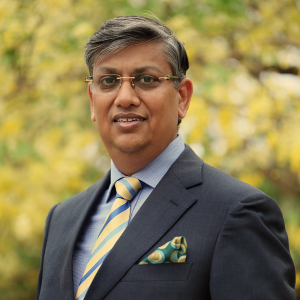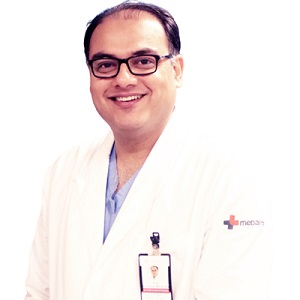Best Doctors in India for Breast Reconstruction Surgery
- Plastic & Cosmetic Surgeon, Gurugram, India
- Over 20 years’ experience
Profile Highlights:
- Dr. Adhishwar Sharma is a reputed plastic surgeon, with an extensive experience in plastic and reconstructive surgery.
- He has been associated with various hospitals like Fortis hospital Noida, Batra Hospital, Metro hospital Faridabad, and Central hospital Faridabad.
- He has an interest in Brachial Plexus reconstruction and lymphedema. He has published articles in various international and national journals. He is a member of various professional bodies.
- Cosmetic & Plastic Surgeon, New Delhi, India
- Over 30 years experience
Profile Highlights:
- Dr. Shahin Nooreyezdan is a well-known plastic surgeon in India with over 30 years of experience. He works as a senior plastic surgeon at the Indraprastha Apollo Hospital in New Delhi.
- Dr. Nooreyezdan extensively works on post-cancer reconstruction, burns & microvascular surgery, and re-attaching amputated limbs to improve the aesthetic appeal as well as deformities correction.
- Dr. Nooreyezdan is also attached to various social responsibility events like “Project Hope,” where he helped in recovering and rehabilitating 33 Christian orphans from the Tsunami-affected Nicobar Islands. Dr. Shahin has been the financial support for providing English and Moral Education to deprived children.
- Plastic & Cosmetic Surgeon, New Delhi, India
- Over 20 years’ experience
Profile Highlights:
- Currently associated with Indraprastha Apollo Hospitals, Dr. Rajesh Watts is a renowned plastic surgeon in Delhi with around 20 years of experience.
- He had completed his MBBS in the year 1990 from Guru Nanak Dev University, and did his MS in General Surgery in the year 1996, from University of Rajasthan. He got his MCh in Plastic Surgery in the year 2003, from Banaras Hindu University.
- Some of the services provided by Dr. Rajesh Watts include instant brow lift treatment, hair loss treatment, hair replacement, hair transplant, etc.
- Plastic & Cosmetic Surgeon, Gurugram, India
- Over 38 years’ experience
Profile Highlights:
- Dr. Anil Behl is an accomplished and skilled plastic surgeon with over 38 years of experience. He has excelled in the field of Burns care, complex reconstructive and aesthetic surgeries.
- He obtained special training in hand surgery in the UK (1993-1994) in Craniofacial Surgery at Providence Hospital USA in 1994-95 and in Aesthetic Surgery in the USA (2000-2001).
- Plastic Surgeon and Cosmetic Surgeon, Chennai, India
- Over 27 years’ experience
Profile Highlights:
- Dr. Chepauk Ramesh is one of the best and most experienced Aesthetics and Plastic Surgeons in India, having about two decades of experience.
- Dr. Ramesh completed a fellowship in Microvascular Surgery at the Nizam’s Institute of Medical Sciences in Hyderabad and Tata Memorial Hospital in Mumbai.
- He gives the best of his assistance to the patients in trauma management, Microvascular Reconstruction, Correction of Congenital Anomalies, Trauma Management, Hand Surgery, Burns Reconstruction, and General and Cosmetic Surgery.
- Plastic Surgeon and Cosmetic Surgeon, Chennai, India
- Over 36 years’ experience
Profile Highlights:
- Dr. Ganapathy Krishnan is a leading Cosmetic or Plastic Surgeon in Chennai and one of India’s most sought-after consultants.
- Dr. Krishnan has been helping patients with the know-how of Reconstructive management for 36 years in this field.
- He received Microsurgery training in Taiwan and practiced for 18 years.
- Plastic & Cosmetic Surgeon, Gurugram, India
- Over 20 years’ experience
Profile Highlights:
- Dr. Vipul Nanda is known as one of the most reputed plastic surgeons in India and has over 20 years of experience. Dr. Nanda did his MS from AIIMS and MRCS in UK. Following MCh from PGI in 1997 he underwent advanced fellowships under world leaders in cosmetic and plastic surgery in Spain, Japan, U.K. & USA.
- Throughout his career, Dr. Vipul Nanda has presented and published his technique of cleft palate repair and rhinoplasty for cleft patients at various national and international fora which have been acclaimed by his peers.
- Plastic & Cosmetic Surgeon, Gurugram, India
- Over 25 years’ experience
Profile Highlights:
- Dr. Rakesh Kumar Khazanchi is the Chairman of Plastic, Aesthetic, and Reconstructive Surgery at Medanta.
- With over 25 years of surgical experience, Dr. Rakesh Khazanchi specializes in cosmetic surgery, reconstructive microsurgery, vascular malformations, replantation of amputated parts as well as head and neck reconstruction.
- Dr. Khazanchi has undertaken 22 research projects, has published over 60 papers in national and international journals, and has also contributed over four chapters in textbooks as well as edited and authored a book of Plastic Surgery for General Surgeons.
- Plastic & Cosmetic Surgeon, New Delhi, India
- Over 28 years’ experience
Profile Highlights:
- Dr. Sunil Choudhary is the Principal Director & Chief of Plastic Surgery at Max Super Speciality Hospital, New Delhi.
- He has over 28 years of proficient experience in the medical field and has been honored for being the first-ever Indian Plastic Surgeon to be awarded Board Certification by the European Board of Plastic, Reconstructive & Aesthetic Surgery in Bern, Switzerland.
- Dr. Choudhary’s outstanding performance, especially in the field of Aesthetic Surgeries such as face reconstruction and breast augmentation, rhinoplasty, and microsurgery has earned him several awards and accolades.
- Plastic and Reconstructive Surgeon, Gurugram, India
- Over 25 years’ experience
Profile Highlights:
- With over 25 years of experience, Dr. Sanjay Mahendru is a fully qualified aesthetic plastic and reconstructive surgeon.
- He went to receive advanced training in Cosmetic Surgery at the Melbourne Institute of Plastic Surgery, Melbourne, Australia.
- He was also awarded the Advanced Aesthetic Plastic Surgery Fellowship in 2008. The fellowship is recognized by the International Society of Aesthetic Plastic Surgery (ISAPS) and is highly sought after the world over.
Best Hospitals in India for Breast Reconstruction Surgery
Indraprastha Apollo Hospital, New Delhi
- City: New Delhi, India
Hospital Highlights:
- Indraprastha Apollo Hospital is a 700-bedded multispecialty hospital in the heart of the capital of India. It is a part of Apollo Hospital group, one of India’s most reputed healthcare chains. Indraprastha Apollo Hospital has been accredited by Joint Commission International, making it the first internationally accredited hospital in the country in 2005.
- There are 52 specialties in the hospital with one of the best cardiology centers in the country. The hospital is also equipped with State of the art infrastructure facilities with the largest Sleep Lab in Asia and the largest number of ICU bed facilities in India.
- The hospital also has one of the largest dialysis units in India along with a dedicated Bone Marrow Transplant unit.
- The latest and highly advanced technologies that are installed in the hospital include Da Vinci Robotic Surgery System, PET-MR, PET-CT, Cobalt-based HDR Brachytherapy, Brain Lab Navigation System, Tilting MRI, Portable CT scanner, 3 Tesla MRI, 128 Slice CT scanner, DSA Lab, Endosonography, Hyperbaric Chamber and Fibro scan.
Fortis Memorial Research Institute, Gurugram
- City: Gurugram, India
Hospital Highlights:
- Fortis Memorial Research Institute is a multi-super-specialty, quaternary care hospital with 1000 beds. The hospital comprises reputed clinicians, and international faculty and is also equipped with cutting-edge technology. The hospital is a part of Fortis Healthcare Limited, a reputed chain of private hospitals in India.
- It is a NABH-accredited hospital that is spread across 11 acres of land and has a capacity of 1000 beds. The hospital has 55 specialties and is one of the premier health care centers in the Asia Pacific region popularly known as “the Mecca of Healthcare”.
- The hospital has 260 diagnostic centers and is also equipped with the latest and advanced techniques that include 3 Telsa which is the world’s first Digital MRI technology. The hospital also has world-class Radiation Therapy techniques which have been developed by leading technology experts from Elekta and Brain Lab.
Apollo Hospital, Chennai
- City: Chennai, India
Hospital Highlights:
- Apollo Hospitals, Chennai, is one of the best hospitals for heart care in India. Over the years, Apollo has expanded all over India, as a healthcare chain.
- India’s first ‘Only Pancreas’ transplant was performed in Apollo Hospital. The hospital is known for successfully performing Asia’s first en-bloc combined heart and liver transplant, and over the years, it has attained a remarkable achievement in the global healthcare space. Around 3-4 organ transplants are performed in the hospital per day.
- Equipped with over 500 beds, this hospital in Chennai was established in 1983 and since then has been among the most preferred hospital for patients from all over the world.
- The hospital holds accreditation of the NABH and JCI and is the first hospital in India to be ISO 9001 and ISO 14001 certified. It is also the first South Indian Hospital to receive subsequent reaccreditation from the JCI USA 4 times.
Medanta-The Medicity, Gurgaon
- City: Gurugram, India
Hospital Highlights:
- One of India’s best and largest multi-specialty hospitals, Medanta was built with the aim to bring India to the highest standards of medical care. The hospital has been providing the best medical services to its patients, since its inception, with care, commitment, and compassion.
- Equipped with 1250 beds, the hospital was founded by Dr. Naresh Trehan in the year 2009 with an aim to provide the best medical care at affordable costs. The hospital is spread across 43 acres and includes 45 operation theatres and 350 beds dedicated solely to ICU. The hospital includes over 800 doctors, and more than 22 specialty departments and has a dedicated floor for individual specialty in order to offer the best services under one roof.
- The hospital is considered one of the premier institutes in India for Cardiac Care and includes staffs and members of high caliber. The hospital has 6 distinct centers of excellence.
Max Super Specialty Hospital, New Delhi
- City: New Delhi, India
Hospital Highlights:
- One of the well-regarded providers in India committed to the highest standards of clinical excellence and patient care, Max Super Specialty Hospital is a part of Max Healthcare, which is the second-largest healthcare chain in India. Regarded as one of the most well-regarded healthcare providers in the country, Max Super Specialty Hospital is committed to the highest standards of clinical excellence as well as patient care. The hospital is also equipped with the latest technology as well as cutting-edge research. The hospital is known to deliver and ensure the highest level of patient care.
- The hospital has more than 500 beds and offers treatment for over 35 specialties. The hospital also holds the credit of having installed the first Brain Suite in Asia. This is a highly advanced Neurosurgical machine that allows MRI to be taken while surgery is ongoing.
- Other advanced and latest technologies are also installed in the hospital such as the 1.5 Tesla MRI machine, 64 Slice CT Angiography, 4D ECHO, LINAC, and 3.5T MRI machine.
Artemis Hospital, Gurugram
- City: Gurugram, India
Hospital Highlights:
- One of the most well-known hospitals in the Delhi NCR, Artemis Hospital is the first hospital in Gurugram to get accredited by the Joint Commission International.
- With more than 40 specialties, the hospital has been designed to be one of the most technically advanced hospitals in the country, with the best medical and surgical health care. The hospital has eleven special and dedicated centers, for Heart, Cancer, Neurosciences, etc.
- The latest technologies in the hospital include Endovascular Hybrid Operating Suite and Flat panel Cath Labs for the cardiovascular department, 3 Tesla MRI, 16 slice PET CT, 64 Slice Cardiac CT Scan, HDR Brachytherapy, and highly advanced Image Guided Radiation Therapy techniques (LINAC) are installed in the hospital.
- The hospital has won several awards as well, since its inception.
BLK Max Super Specialty Hospital, New Delhi
- City: New Delhi, India
Hospital Highlights:
- Equipped with 650 beds, BLK Superspecialty Hospital is the largest stand-alone private sector hospital in Delhi.
- With over 1500 healthcare providers and 150 globally renowned super specialists, the hospital is one of Asia’s largest Bone Marrow Transplant Centres. The hospital is known for having some of the best cancer doctors in the country.
- The hospital is NABH and NABL accredited and was inaugurated by the first Prime Minister of India. Pt. Jawahar Lal Nehru.
Gleneagles Global Hospitals, Chennai
- City: Chennai, India
Hospital Highlights:
- Established in 1999, Gleneagles Global Hospital, Chennai, is one of the top healthcare facilities in Southern India. It is part of the Gleneagles Hospital Chain, which is the fourth largest healthcare chain in the country. The hospital specializes in multi-organ transplants of kidneys, liver, lungs, heart, etc.
- The hospital has an excellent infrastructure and state-of-the-art lab and equipment set-up. The hospital boasts cutting-edge technologies, a highly skilled team of doctors and surgeons, and trained support staff. Located in Perumbakam, Chennai, it is one of India’s premier health care destinations. The hospital has performed some of the most complex surgical and clinical procedures in India including multi-organ transplantations.
- The hospital’s lung transplantation program is one of the best in the country. The hospital is known for having performed India’s first single lung transplant and first minimal invasive lung transplant. It is also the only Indian hospital to be associated with King’s College Hospital, London, United Kingdom for liver transplantations.
Fortis Hospital, Mulund, Mumbai
- City: Mumbai, India
Hospital Highlights:
- Fortis Hospital in Mulund is a 315-bed multi-speciality tertiary care hospital with five JCI accreditations that offers a wide variety of diagnostic and therapeutic services. The Fortis Hospital in Mulund delivers patient-centred treatment with cutting-edge technology, highly skilled and experienced surgeons, and paramedical staff.
- This institution houses Maharashtra’s largest multi-organ transplant centre. It is also the first heart transplant centre in western India to conduct 100 or more consecutive heart transplants in under four years. It is the only hospital in the city to have multi-organ transplants and has handled the youngest patient for angioplasty. Fortis Hospital Mulund now boasts the first advanced surgical robot in central Mumbai.
- Cardiology and heart surgery, urology, nephrology, neurosciences, orthopaedics, digestive care, emergency and critical care, and maternity care are among the services provided by the hospital.
Kokilaben Dhirubhai Ambani Hospital, Mumbai
- City: Mumbai, India
Hospital Highlights:
- Kokilaben Dhirubhai Ambani Hospital, Named after the wife of Indian industrialist Dhirubhai Ambani, the founder of Reliance Industries, this is one of the top hospitals in Mumbai. This 750-bed multi-specialty hospital became operational in 2009. Known as one of India’s most advanced tertiary care facilities, the hospital is designed to raise India’s global standing as a healthcare hub, with an emphasis on excellence in clinical services.
- Kokilaben Dhirubhai Ambani Hospital uses Protocol and Care Pathway based treatment models to ensure the best outcomes for patients.
- The hospital represents a confluence of top-notch talent, cutting-edge technology, state-of-the-art infrastructure, and, most importantly commitment.
- The hospital also holds the accreditation of the NABH, NABL, CAP, and JCI.
- The hospital has been recognized as the No. 1 Multispecialty Hospital in Mumbai and the West Zone for the fifth year in a row in 2020 by The Week.
Breast Reconstruction Surgery
Women who undergo breast cancer surgery can choose breast reconstruction surgery for rebuilding the shape and look of their breast.
The procedure can be done several months or even years after going through surgery for breast cancer. Breast reconstruction can be of various types.
Purpose
Women consider breast reconstruction for various reasons:
- To make her chest look more balanced while she is wearing a bra or swimsuit.
- To help her clothes fit better.
- To regain her breast shape permanently.
- To feel better and more confident about her body.
Though this procedure often leaves scars, they can fade over time. There are newer techniques which have reduced the amount of scarring. While wearing a bra, a woman’s breasts should look alike in size and shape, helping her feel confident and comfortable in most types of clothing.
However, it is noteworthy that the reconstructed breast is generally not a perfect match or substitute for a natural breast.
If tissue from your back, tummy, or buttocks were used as part of your reconstruction procedure, then it is likely that those areas will look different after your surgery. It is important to talk to your surgeon about scars and changes in shape or contour.
Types
Breast reconstruction is generally of two types-
- Implants – Implants are generally made out of silicone or saline or sometimes a combination of both. They are generally placed underneath the chest muscle.
- Flaps- Flap procedures are performed by plastic and reconstructive surgeons specializing in microsurgery. During this procedure, a breast is created using tissue taken from other body parts. This can be your abdomen, back, thigh, or buttocks. The tissue is then transplanted to the chest by reconnecting the blood vessels to any new ones in your chest region.
Preparation
If you have decided to go for breast reconstruction, you need to consider several things, as you and your doctors talk about which kind of reconstruction is going to be best for you. Some factors you and your doctors need to think about while considering your options include:
- Your overall health
- Your breast size
- The location and size of your breast cancer
- Your breast cancer surgery (lumpectomy or mastectomy)
- Whether you had any other treatments other than surgery for your cancer
- The amount of tissue that is available
- Your insurance coverage
- Whether you want reconstructive surgery on one or both breasts
- How quickly you want to be able to recover from surgery
- How different types of reconstructive surgery might affect other body parts
- Whether you are willing to have more than one surgery as part of the reconstruction
Your surgeon will need to review your medical history as well as your overall health. Then he/she will decide and will explain which reconstructive options might be best for you based on your age, health, body type, as well as other factors.
You will need to discuss with your surgeon openly about your preferences. Be sure to voice any concerns if you have any.
Your breast surgeon and your plastic surgeon will likely give you instructions on how you can prepare for your surgery. It will probably include:
- Help with quitting smoking if you smoke regularly
- Instructions on consuming food and drink before surgery
- Instructions for taking or avoiding certain kinds of vitamins, medicines, as well as dietary or herbal supplements for some time prior to your surgery
Arrange for someone for taking you home or book a cab after your stay at the hospital. You might also need someone to help you out for a few days after the surgery.
Procedure
Generally, the first stage of reconstruction is done using general anesthesia. This means you will be given sedatives and will be asleep during the entire procedure.
During the follow-up procedures, you will likely need only local anesthesia. This means that only the area where the doctor is working on is going to be numbed. A sedative drug might also be used for making you feel relaxed but awake.
Implants
When a breast is being reconstructed with implants, a surgeon will first need to insert silicone or saline implants underneath your skin or muscle, in the place of the previous breast tissue.
This can be a two stage procedure for most people. During the first stage, your surgeon will place a tissue expander underneath the remaining breast skin or pectoralis muscles. This expander will be serving as a temporary saline implant which will gradually stretch your remaining tissue.
After the person has healed completely after the surgery, your surgeon will need to inject sterile saline or saltwater through your skin into the tissue expander weekly. This balloon grows over time, stretching the overlying skin and muscle until the breast can reach a size that is comfortable for you.
When the chest tissues heal and enough saline has been added to the tissue expander in preparation for the implants, the second procedure will be performed for inserting the implants.
Next, your surgeon will remove the tissue expanders and replace them with either a silicone or saline implant.
Skin flap surgery
In a skin flap surgery, your surgeon will be taking tissue from another part of the body, and then he/she will be moving it to the chest for rebuilding the breast.
The surgeon will usually remove this tissue from various places of your body, which can include the buttock, back or thigh. Skin flap surgery might be highly complex, as it involves transferring tissue from one area of the body to another.
Skin flap surgery is also of two types.
Free flap surgery
In free flap surgery, a surgeon will completely remove the tissue and the blood vessels, for placement in the breast. In this method, they stitch those blood vessels into your other blood vessels in your chest at the intended site of placement. These blood vessels are generally quite small and therefore, the surgeon will be using a microscope for sewing them together. This method is known as microsurgery.
Pedicle flap surgery
In pedicle flap surgery, your surgeon will not entirely remove your transplanted tissue from its blood vessels. Instead, the tissue is going to remain attached to the body and the surgeon will be rotating this into the chest to form the breast.
In this method, your surgeon may use tissue from the abdomen or back for pedicle flap surgery.
Aftercare
Since breast reconstruction is major surgery, a person might need to spend a few days at the hospital, whether it was implant reconstruction or flap reconstruction.
Sometimes, people might need more than one single surgery for fully reconstructing the breast(s). Generally, skin flap surgery usually has a longer recovery time than implant reconstruction.
In both types of surgery, you will be unable to perform most of your daily activities for around two months. There might be a psychological impact of losing one or both of your breasts as well.
In the first two months of recovery, people generally experience:
- fatigue
- restrictions on movement
- pain, swelling, bruising, or soreness in the breasts and at the site from which the surgeon removed tissue
Following the surgery, you will most likely require stitches and drainage tubes. Within time, though some sensation will return, reconstructed breasts will not be providing the same level of sensation.
Nipple reconstruction might also be required. During this procedure, a surgeon will be sewing together small pieces of skin on the reconstructed breast to create a bump that will resemble a nipple.
Risks and complications
The risks and complications which can occur during the procedure include:
- extreme fatigue
- bleeding or blood clots
- fluid buildup in the breast or at the donor site (for skin flap surgery)
- infection
- slow or disrupted wound healing
- potential complications with anesthesia
After surgery, there might be some additional complications such as:
- tissue death or necrosis, which might occur in the skin, fat or tissue flap
- a loss of muscle strength at your donor site, if skin flap surgery was performed
- changes in breast or nipple sensation
- need for more surgical procedures in case of complications
- uneven breasts
- problems with the implant, such as movement, leakage, rupture or scar tissue
- a need to remove the implants

